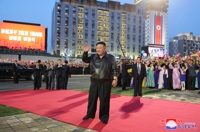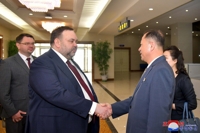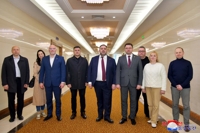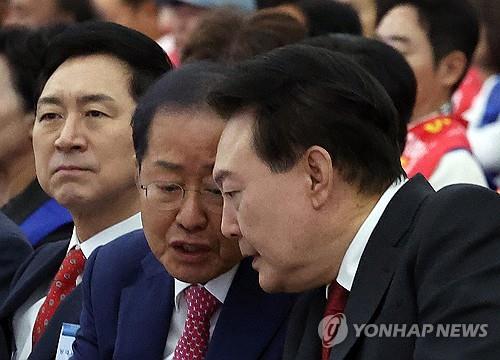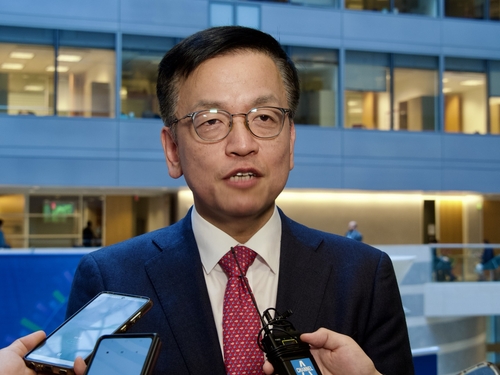N. Korean nuclear capabilities would be much greater without 1994 nuclear freeze deal: ex-U.S. negotiator
WASHINGTON, Oct. 20 (Yonhap) -- North Korea could have moved its nuclear capabilities more significantly forward to a point where it could produce dozens of nuclear bombs a year had Pyongyang not been stopped by a 1994 nuclear freeze deal, the then-U.S. negotiator said Monday.
Robert Gallucci, who negotiated the Agreed Framework deal with Pyongyang that defused the first North Korea nuclear crisis, made the case during a seminar commemorating the 20th anniversary of the landmark agreement that committed Pyongyang to suspending its nuclear activities.
Had it not been for the deal, the North could have used its main 5-megawatt reactor and two others under construction at the time -- 50 megawatts and 200 megawatts -- to produce some 200 kilograms of plutonium, worth about 40 bombs, a year.
Gallucci said the North also would now have a more advanced uranium program had it not been for the 1994 deal.
The deal, also known as the Geneva Agreement, committed North Korea to freezing and ultimately dismantling its nuclear program in exchange for two proliferation-resistant light water reactors for power generation, and the normalization of relations with the United States.
But the landmark agreement fell apart with the second nuclear crisis in late 2002, with revelations that Pyongyang had pursued a clandestine uranium enrichment program. The six-party talks were then launched in 2003 to defuse the crisis, but the standoff is still ongoing.
Participants in Monday's seminar, including former South Korean Foreign Minister Han Sung-joo and former U.S. Ambassador to Seoul Stephen Bosworth, talked about what happened before, during and after the deal was reached, including how close the Korean Peninsula situation was to another war.
But most of them shared the view that negotiations with Pyongyang should reopen.
"At the moment, the countries who led the effort of the Agreed Framework, the United States and South Korea, seem to ... have concluded that at least for foreseeable future, the best thing to do is nothing," Bosworth said. "I think some of us (here) are less than totally convinced that is in fact the best policy prescription for the U.S."
Bosworth also said the 1994 deal was based on a "myth" about North Korea that it was about to collapse, so the thinking was "all we needed was a temporary fix to this problem."
jschang@yna.co.kr
(END)
-
 Defense chief says N. Korea's hypersonic missile 'unsuccessful' in last-stage glide flight
Defense chief says N. Korea's hypersonic missile 'unsuccessful' in last-stage glide flight -
 Relax, immerse yourself in scents at Venice Biennale's Korean Pavilion
Relax, immerse yourself in scents at Venice Biennale's Korean Pavilion -
 Overdue debut of Korean abstract art pioneer Yoo Young-kuk at Venice Biennale
Overdue debut of Korean abstract art pioneer Yoo Young-kuk at Venice Biennale -
 N. Korea has capability to genetically engineer biological military products: U.S. report
N. Korea has capability to genetically engineer biological military products: U.S. report -
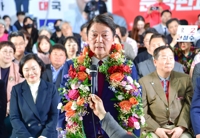 PPP lawmaker says entire Cabinet should resign over general elections defeat
PPP lawmaker says entire Cabinet should resign over general elections defeat
-
 Relax, immerse yourself in scents at Venice Biennale's Korean Pavilion
Relax, immerse yourself in scents at Venice Biennale's Korean Pavilion -
 Overdue debut of Korean abstract art pioneer Yoo Young-kuk at Venice Biennale
Overdue debut of Korean abstract art pioneer Yoo Young-kuk at Venice Biennale -
 Defense chief says N. Korea's hypersonic missile 'unsuccessful' in last-stage glide flight
Defense chief says N. Korea's hypersonic missile 'unsuccessful' in last-stage glide flight -
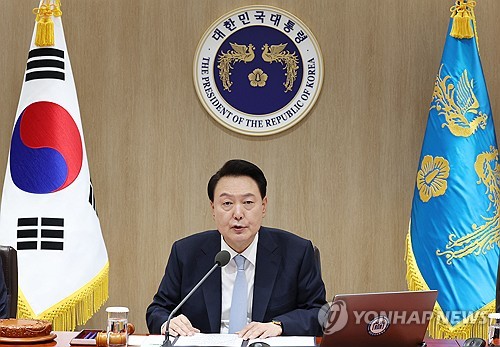 (LEAD) Yoon vows to improve communication with people after election defeat
(LEAD) Yoon vows to improve communication with people after election defeat -
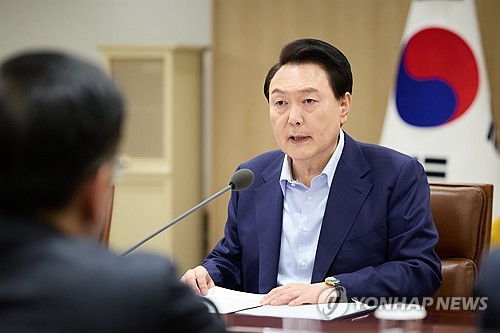 Yoon presides over emergency meeting on Mideast crisis
Yoon presides over emergency meeting on Mideast crisis
-
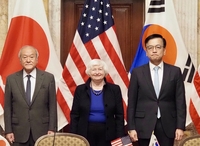 (4th LD) Finance chiefs of S. Korea, U.S., Japan recognize 'serious' concerns over 'sharp' won, yen depreciation
(4th LD) Finance chiefs of S. Korea, U.S., Japan recognize 'serious' concerns over 'sharp' won, yen depreciation -
 S. Korea to provide 100,000 tons of rice to 11 nations
S. Korea to provide 100,000 tons of rice to 11 nations -
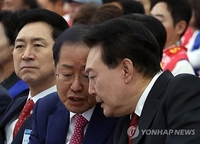 Yoon, Daegu mayor met to discuss post-election matters: sources
Yoon, Daegu mayor met to discuss post-election matters: sources -
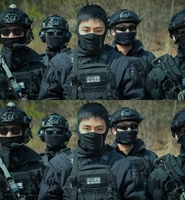 Facebook page unveils photos of BTS member V in counter-terrorism unit gear
Facebook page unveils photos of BTS member V in counter-terrorism unit gear -
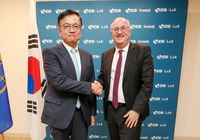 S. Korea to provide US$200 million in humanitarian aid to Ukraine this year
S. Korea to provide US$200 million in humanitarian aid to Ukraine this year
















